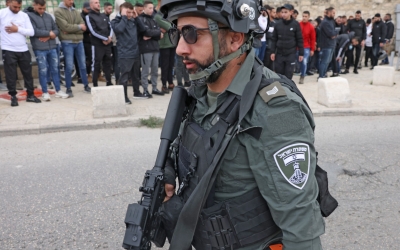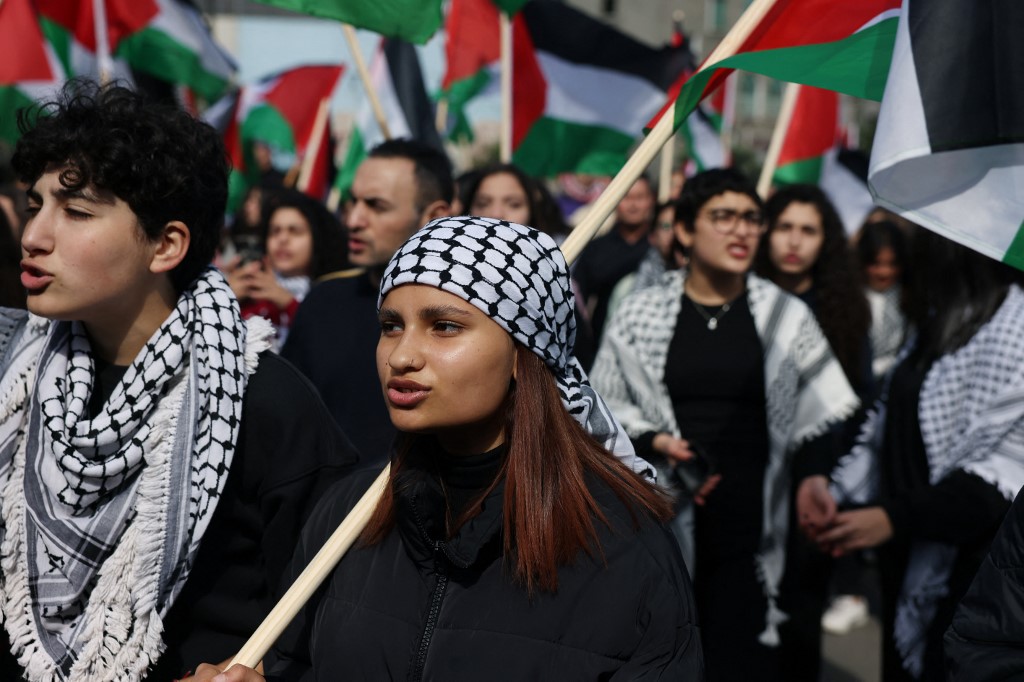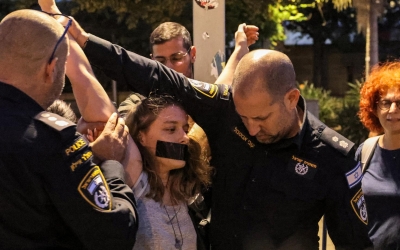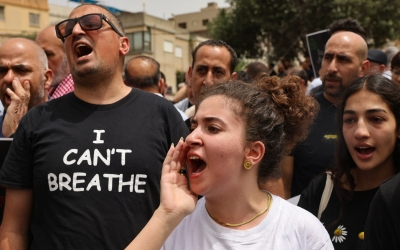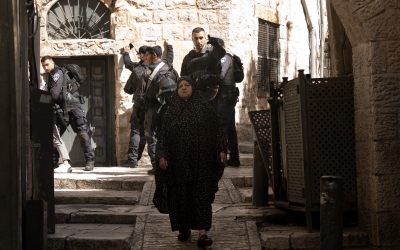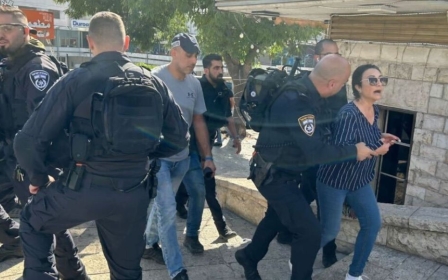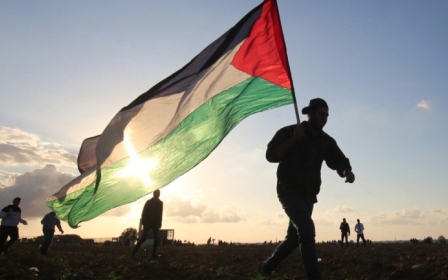The year when Israel began treating its Palestinian citizens officially as enemies
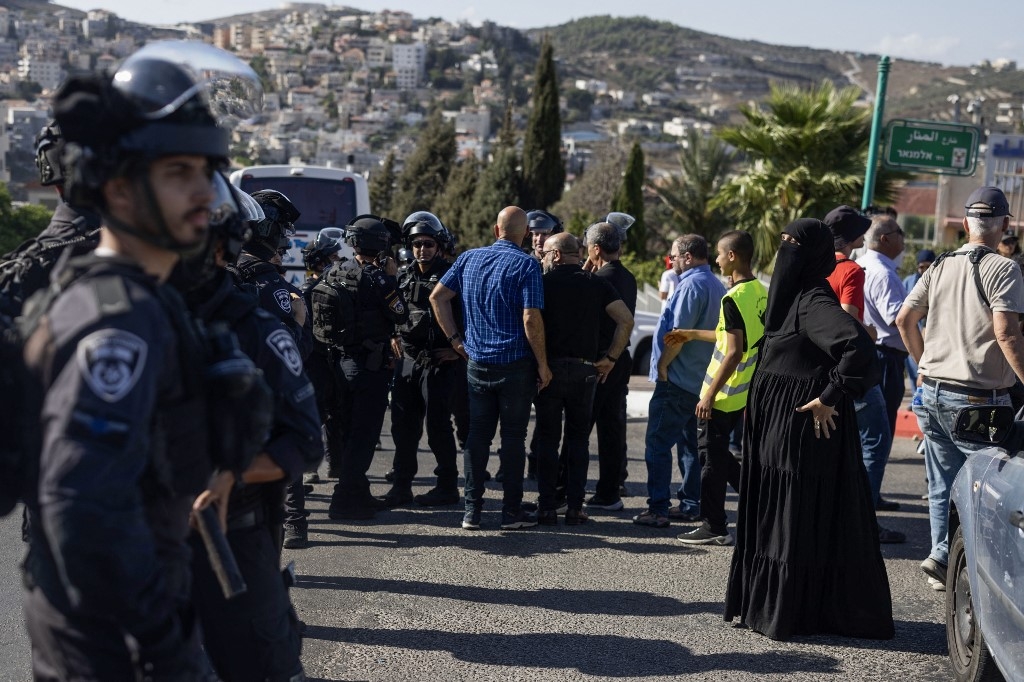
This is an interview of Dr. Hassan Jabareen, director of Adalah (The Legal Centre for Arab Minority Rights in Israel), made by Orly Noy, chairwoman of B'Tselem (The Israeli Information Centre for Human Rights in the Occupied Territories) and a regulator contributor of Middle East Eye. It was originally published in Hebrew by the online Israeli-Palestinian media Siha Mekomit and has been translated by MEE without editorial changes.
It is still difficult to assess the full consequences of the year that has unfolded since the Hamas massacre in the southwestern Negev region last October, the kidnapping of over 250 people as hostages, and then the war of devastation in Gaza that is still ongoing.
Tens of thousands of Gazans have been killed, Israel is facing charges of genocide at the International Court of Justice, and meanwhile hundreds of thousands of Gazans have been turned into refugees.
But one thing is clear enough: this was a year that produced profound and probably irreversible changes in the lived reality of all the inhabitants of the space between the [Jordan] River and the [Mediterranean] Sea.
Among all the arenas of Israel's actions since last autumn, one of the least-discussed is about what Israel has been doing vis-a-vis the Palestinians who are citizens of Israel. Under the aegis of the war on Gaza, Israel for the last year has been engaged in a multi-dimensional campaign against these people, who represent some 20 percent of its own citizens.
New MEE newsletter: Jerusalem Dispatch
Sign up to get the latest insights and analysis on Israel-Palestine, alongside Turkey Unpacked and other MEE newsletters
This has involved unprecedented persecution promulgated not just by official state institutions, but also by key civil society agencies and actors. On this front, even the bodies of deceased Palestinian citizens have been weaponised by the state.
Although Israel has never treated the Arab population in Israel itself as equal citizens, what has been happening since 7 October is unprecedented, says Dr. Hassan Jabareen, director of Adalah, in a special interview summarising events of the past year.
He points out that, in relation to Arab citizens, the positions advocated by far-right Minister of National Security Itamar Ben Gvir have been adopted not only by the Israeli government, but also by the universities, the national bar association, even the attorney general.
'Arab citizens are the enemy'
Hassan Jabareen: We have been through the violent escalations of October 2000, the Second Intifada [200-2005], [Israeli military operations] Defensive Shield in 2002, Rainbow in 2004, Cast Lead in 2009, Pillar of Defence in 2012, Protective Edge in 2014, the [repression of the Palestinian civilian] Great March of Return in 2018, Operation Guardian of the Walls in 2021 - but since 7 October, we are experiencing for the first time unprecedented things in the realm of civil rights.
Notably, this is the first time that we are being officially identified by the prime minister as an enemy.
In his first speech after 7 October, Netanyahu listed four fronts, one of which was the internal front. When he spoke about this internal front, he adopted Ben Gvir's narrative, according to which the country's Arab citizens attacked the Jews in May 2021, and linked it up with the war by Hamas against the Jews in Israel.
This does not portray even a fifth column, which involves a degree of passivity, but rather an active adversary.
Ben Gvir ran for office on that ticket and his popularity rose. The same narrative was adopted in Netanyahu's first speech.
'This does not portray even a fifth column, which involves a degree of passivity, but rather an active adversary'
- Dr. Hassan Jabareen, director of Adalah
Never before in Israel had a prime minister stated explicitly that Arab citizens are the enemy; on the contrary. In wartime, both left-wing and right-wing prime ministers who wanted to muffle Arab voices chose the opposite direction and said that the Arabs in Israel are maintaining the country's security and are loyal.
The minute Netanyahu made that speech last October, we began seeing drastic changes.
Immediately, there were declarations about changing the open-fire regulations within the Green Line [marking the borders of Israel after the 1948 Arab-Israeli war], and for the first time since the end [in 1966] of the military administration [in Palestinian towns inside Israel], there was an official announcement prohibiting demonstrations by Arab citizens within Arab towns.
At first, we thought that the public declaration by the police commissioner - 'Anyone who wants to demonstrate for Gaza should go to Gaza; we’ll provide the bus' - was unintended. But it quickly became clear that there was now to be a total prohibition against demonstrating.
We went to the high court on behalf of the [left-wing Arab-Israeli] Hadash party and the Arab Higher Monitoring Committee [an independent political organisation whose aim is to coordinate the political actions of various Israeli-Arab bodies] demanding a permit for a demonstration in Sakhnin or Umm al-Fahm.
We thought that the state attorney and the attorney general would support the position that demonstrations should be allowed with a permit, and that the decision by the high court would be about the conditions, which generally address time and place.
We know that the high court's record on the right to demonstrate is very positive, in the sense that the high court has always leaned toward allowing demonstrations to be held, if sometimes subject to conditions. It even allowed [Israeli far-right activist and settler] Baruch Marzel to hold a demonstration in Umm al-Fahm, although the police had said that it would endanger his safety and that of the demonstrators.
In fact, I can tell you with certainty that there has been no decision since the adoption of the country's Basic Laws in the 1990s in which the high court did not stand up for the freedom to protest. This year however, the high court for the first time rejected a petition for the freedom to demonstrate with a permit. Not for a demonstration by Arabs in a Jewish town or a mixed [Palestinian-Jewish] town, but in their own communities.
Orly Noy: The public discourse in Israel tends to attribute a great many of these anti-democratic processes to Ben Gvir personally, but you are describing much deeper processes that correspond with the "enemy subjects doctrine", which you have used to analyse the attitude of the state toward Palestinian citizens.
HJ: The Ben Gvir narrative in fact has been adopted by the attorney general and by the high court itself when ruling on this petition. Explaining its reasoning, the high court said that the police lack adequate personnel to provide protection for a demonstration inside Umm al-Fahm or inside Sakhnin, even though there is no need for police [at demonstrations] inside Arab towns.
There was another attempted challenge by the Arab Higher Monitoring Committee, which did not want to give up and insisted on making its voice heard, but only within a lawful framework, because it was aware that we are in a war situation and it did not want to give the rightist bloc political ammunition to attack the Arabs.
The Arab leadership sought to hold a gathering with fewer than 50 participants, including members of the Knesset and the Arab Higher Monitoring Committee, in Nazareth. Such an assembly does not require a permit. And what happened was that all the leadership, led by Mohammad Barakeh [chair of the Arab Higher Monitoring Committee] were arrested to prevent them from holding a lawful gathering.
So we went to the high court again. We thought that here, the police were acting contrary to the law - that is, putting the police above the law. And once again, the court and the attorney general sided with the police on a petition involving an assembly that does not even require a permit!
Here we did something unprecedented. In the course of the discussions, Mohammed Barakeh stood up and told the court: "I’m withdrawing the petition," to send the message that he did not trust them.
The amazing thing is that the court issued a ruling anyway, despite our having withdrawn the petition, because it did not want to enable the Arab leadership to send that message - that it doesn't trust the high court. They continued deliberating even though the petition no longer existed and we had left the courtroom!
These are two examples that show that the judicial system is changing, and that the attorney general and the state attorney are behaving in a Ben Gvir-like manner.
The court rejected a petition on prisoners' rights brought by human rights organisations, without even holding a preliminary hearing.
One of the petitions dealt with people from Gaza who wanted to know whether their children had been arrested or not, because some of them were in Israel and the families did not know what had happened to them. The high court rejected the petition without a hearing, although it involved habeas corpus. Those petitions are the strongest and are certainly not rejected out of hand.
There is something very interesting here. When Jews were also prevented from holding demonstrations and petitioned the high court, the attorney general and the court defended their rights, but the prohibition on demonstrations by Arabs was in effect for a long time. This is something we had not experienced since the end of the military government [in Palestinian communities in Israel].
Beyond that, however, we are seeing that the state attorney is giving a green light to the police for actions contrary to the law without intervening.
For example, there was another attempt to hold a gathering, and the attorney general sent us a letter in which she wrote that she is not intervening in operational decisions of the police. That is the first time that we have received such a letter, because all the operational decisions of the police vis-a-vis citizens are decisions involving civil rights.
We also have seen the police starting to open investigations based on social media posts without prior authorisation from the state attorney. In other words, the police are being powerfully green-lighted to act unlawfully, including by initiating investigations.
I'm stressing the matter of the freedom to demonstrate in order to say that Arab citizens have been unable to take to the streets and there has been no political activity, even though they have wanted to.
Nonetheless, in the first three months of the war, the number of indictments was equal to the number filed over the last five years – for things that were never the subject of indictments in the past, like the prosecutions against someone who posted "Good morning, Gaza." Many of these posts expressed sympathy for the suffering of the residents of Gaza. And there is another level here.
We talked about the high court level, now let's go down one level, to the people's courts – that is, the magistrates' courts located in every city. The state attorney made a decision not just to file indictments, but also to operate on a zero-tolerance policy regarding freedom of expression, and also to ask in each case for detention until the end of the proceedings.
In and of itself, that decision is contrary to the law. The rules of criminal law say that such a sweeping decision is prohibited, because each case has its own circumstances that should be given due weight. So, they are arresting people and asking for detention until the end of the proceedings, and the courts are responsive to these requests.
ON: In addition, there were also administrative detentions [a regime used by Israel in the occupied West Bank to hold Palestinians in prison indefinitely without charge or trial] of Arab citizens.
HJ: There were, but relatively few. And that's exactly the reason – because the magistrates' courts, the state attorney and the police did what could be done with administrative detention without calling it administrative detention! So, they ordered detention until the end of the proceedings for the most ridiculous things.
Arrest until the end of the proceedings means that if this person is released, they will endanger the public order, disrupt the legal proceedings or both. But we have seen cases where people were arrested for things they had posted on social media two weeks prior to the arrest, and the court allows the arrest and extends it, so how is it possible that this person walked around freely for two weeks without endangering anyone and now they are suddenly so dangerous?
ON: Among those arrested there was a surprisingly high number of women.
HJ: At a certain stage, more women were being arrested than men. This is something we have never seen before, not here and not in the West Bank, and we started analysing why this was happening.
Some thought that because the men knew they were under greater threat, they were being more careful than the women in what they were writing. But it turned out to be something more sinister: women were being arrested to negotiate exchanges with Hamas.
With the first [hostage exchange] deals, we contacted people close to Hamas in the West Bank to find out if they had supplied the names of these women. They said: "We didn't give names at all – not from the West Bank, not from Gaza, and not from Israel, because the deal is based on categories: we free women and they likewise free women. We didn't decide who the women would be," meaning they didn't even know who the women that Israel was going to release were.
'Discrimination has always existed […]. But this year, we moved from the discrimination stage to the repression stage'
Some of the parents of these young women petitioned the high court to prevent their daughter's names from being included in the deal, arguing that if their daughter's name was included in the exchange deal, she would have no future in Israel because everyone would view her as someone who benefited from the murder of Jews on 7 October.
They asked for a trial, because there was no foundation whatever for the arrest. The high court rejected the petition. One of the women who was released is a student at the Technion [Israel Institute of Technology], and after her release, the Jewish students demonstrated against her on campus and the Technion filed disciplinary charges against her.
Something similar also happened with corpses. In the past, we always won cases involving the return of bodies, even in the case of the three from Umm al-Fahm who perpetrated an attack at Al-Aqsa [Mosque in Jerusalem's Old City] in which police officers were killed. The high court then ruled that the police have no authority to withhold the bodies.
Now, for the first time, the bodies of Arab citizens are being held in Israel as a bargaining chip for an exchange of bodies with Hamas. In other words, the body also becomes the body of an enemy, not of a citizen of the country.
These cases are still pending before the high court, but the attorney general supports the position taken by Ben Gvir, who started this process. The attorney general can be fierce when she is fighting for Jewish democracy, but when it comes to relations with the Arabs, she turns into Ben Gvir.
On the issue of the bodies, the state has in fact tied our fate to the fate of families from the West Bank and Gaza. More than anything else, the bodies have erased the Green Line for us. Because what the state is telling us is that our fate right now depends on Hamas – that is, on whether Hamas succeeds in their negotiations and are holding the cards to return the bodies of our children.
And we know for a certainty that there were people in the security establishment and in the cabinet who were saying: "Gentlemen, you are pushing the Arabs [in Israel] into the arms of Hamas. You are telling them that Hamas is responsible for them."
ON: Do you consider these processes to be a fundamental change in the relationship between Israel and its Arab citizens, or as a one-time thing due to the circumstances of the war? In other words, are these processes reversible, in your view?
HJ: First of all, we see that there has been a change in the state's attitude toward us, as an enemy during wartime. The entire establishment is doing this, from the magistrates' courts to the supreme court, from the state attorney's office to the police on the ground.
A glaring example of this attitude is the two people who were arrested at a demonstration in Umm al-Fahm, not because they conducted an unlawful demonstration and not because the demonstration wasn't peaceful, but because of three of the slogans chanted at the demonstration, slogans identifying with the residents of Gaza, which are heard during any [Israeli] military campaign.
These people remain under restraining orders to this day. One of them spent eight months in prison as a security prisoner, without family visits and under the harshest conditions, and the other spent four months in prison and was then exiled to Haifa.
These two cases testify to the policy of repression. One could say that Israel's policy toward Arab citizens is not simply discriminatory. Discrimination has always existed, during every military operation, and we have published reports on this, [showing] that Arabs are arrested more than Jews and that there is selective enforcement.
This always existed. But this year, we moved from the discrimination stage to the repression stage.
ON: Apparently, this involves a profound change that extends far beyond matters tied directly to the war, like demonstrations and social media posts. In the last year, we have also seen the state's attitude worsening in terms of issues unrelated to the war: the ethnic cleansing [of the Bedouins] in the Negev, the economic oppression, the intensification of organised crime [within Palestinian communities in Israel]. There is something systemic here involving far more than the war.
HJ: That comment is important because it reminds us of a subject of very pivotal importance: the issue of crime. On the eve of the war, we had reached a situation such that the rate of crime among Arab Israelis was at nearly the highest level anywhere in the world: 15 homicides per 100,000 people.
In the West Bank and in Gaza, for the sake of comparison, the [homicide] rate is one person killed per 100,000 people. In the United States, 6 per 100,000. There are only a few countries in Latin America with rates comparable to ours.
Until the war, we managed with great effort to inject the subject of crime among Arabs in Israel into the public discourse. And before 7 October, Israel media began to seriously address the failure of the police to deal with crime.
A not negligible portion of the media even began hinting that the failure is evidently intentional.
Since the war, however, the police have not dealt with this issue, nor have the media. That is, we have truly turned into the enemy from the standpoint of the media, too. The few instances when they relate to crime are when someone brings up the possibility that weapons in the possession of Arabs might be used to harm Jews.
So what did all of this broadcast to Arab citizens? We have always known, in times of war and times of peace, that we are second-class citizens, and our struggle has always been to aspire to equality. Hence, we did not content ourselves with legal defence, but sought to establish a policy.
Legal battles are of two types: defence or a claim of rights. Today, for the first time, I see that from the perspective of the Palestinian population, Israel sees itself as occupying us, and we see ourselves as being under occupation, in the sense that you do not demand rights from the occupier, but only defend yourself against him.
That's why Adalah has not had any petitions to the high court [since 7 October], apart from the defensive aspect. During times of war, we would often petition the high court, but this time, for the first time, we no longer refer to ourselves as second-class citizens, but rather as subjects.
This is what has become stronger in one's consciousness. When the state treats you as an enemy, you cannot conduct a discourse based on citizenship: citizenship becomes irrelevant.
ON: What you are saying is very sad, because over the years, Palestinian citizens may have been the group that addressed its citizenship much more seriously, including by publishing [a joint] document describing a vision for a shared civil future. The vision of a "state of all its citizens" is based on the profound idea of citizenship as essential. And you are saying that, actually, the concept of citizenship has been emptied of all content.
HJ: Correct. The examples you mentioned are evidence of the desire for equality within the framework of citizenship.
And this picture is complete when you also lose faith in the mechanisms of Israeli civil society.
The most prominent, largest and most important civil society organisations are the universities and colleges. For the first time since 1948, the universities and colleges are filing disciplinary charges against Arab students who expressed themselves politically on Facebook, during the vacation period, with no connection to the campus or their academic studies. And yet, a university – illegally – arrogates for itself the authority and files charges against almost 150 students. That was surprising.
'When the state treats you as an enemy, you cannot conduct a discourse based on citizenship: citizenship becomes irrelevant'
We must understand the significance of this. In the West Bank, for example, the most cherished thing for the society is the issue of the prisoners. For Arabs in Israel, the most cherished thing is university studies for young people. Higher education. The blow here affected nearly every family.
The universities filed significant disciplinary charges, although the police did not investigate. I have described the extent to which the police have been racist toward Arabs and acted in break of the law, but even the police did not do what the colleges and universities have done.
The university is frequently the first place where young Arabs meet Jews. They sit on the same bench in class, they take the same exams, they have the same vacations, and they worry about the same kinds of things.
They also sometimes demonstrate against one another on campus. But nevertheless, this liberal university says: "We are doing nothing against racist Jews who call for genocide, but are issuing disciplinary charges against anyone who sees themselves as close to Gazans."
The same process was conducted by the national bar association. To begin with, the bar association assumed the authority to bring charges at its disciplinary courts against Arabs for statements having nothing to do with the law or the honour of the legal profession, statements that were published on people's private Facebook accounts.
We should also pay close attention to the explanations given by these institutions. We asked the universities why they had not filed charges against Jewish students who called for genocide, an act that is a crime under Israeli and international law, why they had not filed complaints of inciting violence and of racism, given that we brought [as evidence] dozens of such posts, by students and also by Jewish lawyers who posted not on their private Facebook pages but in Facebook groups for lawyers.
[The universities] replied that their instructions are to fight back only against those who support terrorism, meaning actions tied to 7 October or Hamas. That is why they treat sympathy for Gaza as support for terrorism.
They filed a complaint against attorney Fouad Sultan because he said thank you to South Africa [for filing a case for genocide against Israel at the International Court of Justice] and because he claimed that Ben Gvir is the nub of the problem on account of his attitude toward prisoners.
I don't know how to defend myself against this, because I don't understand what the problem is.
ON: You are describing a situation that is nearly inescapable, because we are already talking not just about official state institutions and the transition from discrimination to oppression, but also about the civil realm, where the attitude toward Arab citizens has also become one of relating to an enemy. If citizenship is emptied of all content, what basis is left for a shared existence?
HJ: I think that if we understand the inherent danger in this attitude, we have no choice but to join forces in a struggle against racism.
What we see now is that this policy has already cut across the categories of Arabs and Jews. For the first time, we notice that most of our detainees in the three waves of arrests in Haifa have been Jews, because the fascist regime is working against anyone who opposes it.
'For the first time, we are experiencing something beyond the Nakba: genocide. Nonetheless, the dominant question is how to live together, because it is already clear that war and force are not the solution'
As in the wars of 1948 and 1967, this war, too, has become a historically defining moment.
1948 is seen as independence for one side and catastrophe ["Nakba"] for the other; 1967 [when Israel defeated Arab states in six days and occupied the West Bank including East Jerusalem, the Golan Heights, the Gaza Strip and the Sinai Peninsula] is seen as a tremendous victory for one side and a great defeat for the other.
On 7 October, for the first time, both sides emerge injured; both come to the conclusion that even if neither side can make the other disappear, both can hurt each other. And so, if 1948 raised for the first time the question of the significance of the Jewish state, and 1967 raised for the first time the question of the Greater Land of Israel and the settlements, 7 October raises for the first time the question of not how to kill each other, but how to live together.
ON: That is a very optimistic view of the situation.
HJ: Bear in mind one important thing. It's not accidental that Netanyahu's slogan, "Total Victory", is perceived by the Jewish public as a joke, as something unrealistic; and [that] among the Palestinian public, it's not realistic to say that the resistance [against Israel] has won. They both know that this war has hurt them.
True, we Palestinians pay the highest and deepest price. For the first time, we are experiencing something beyond the Nakba: genocide. Nonetheless, the dominant question is how to live together, because it is already clear that war and force are not the solution.
Middle East Eye delivers independent and unrivalled coverage and analysis of the Middle East, North Africa and beyond. To learn more about republishing this content and the associated fees, please fill out this form. More about MEE can be found here.


